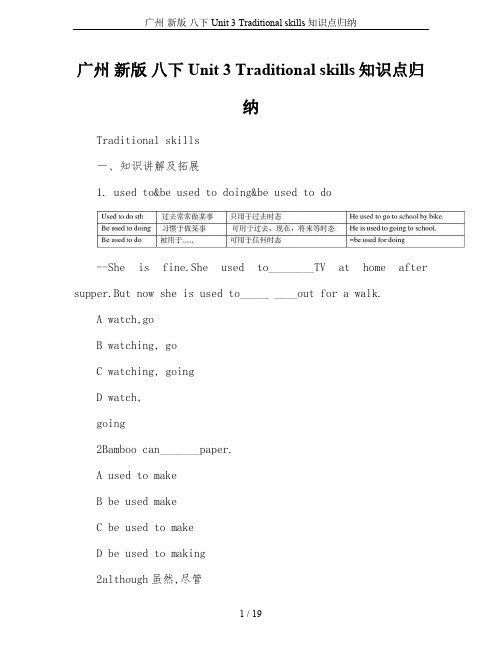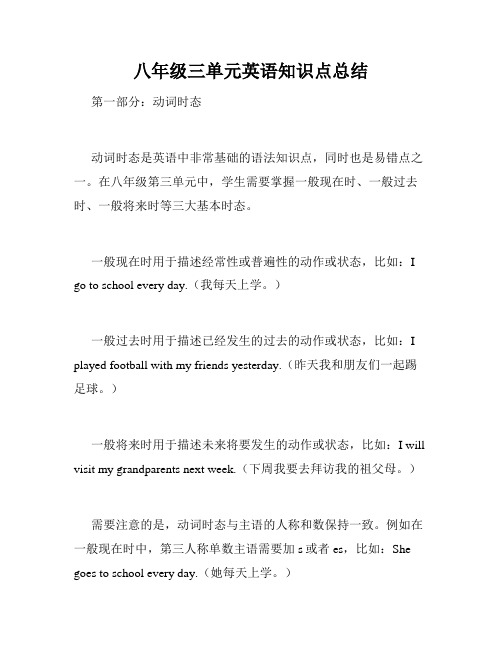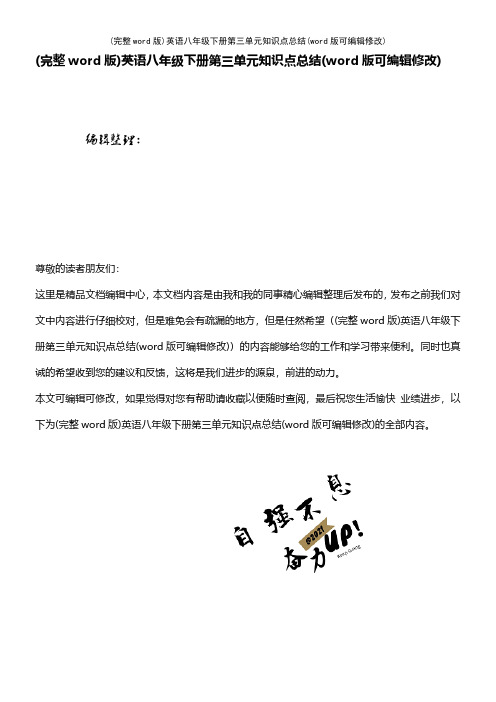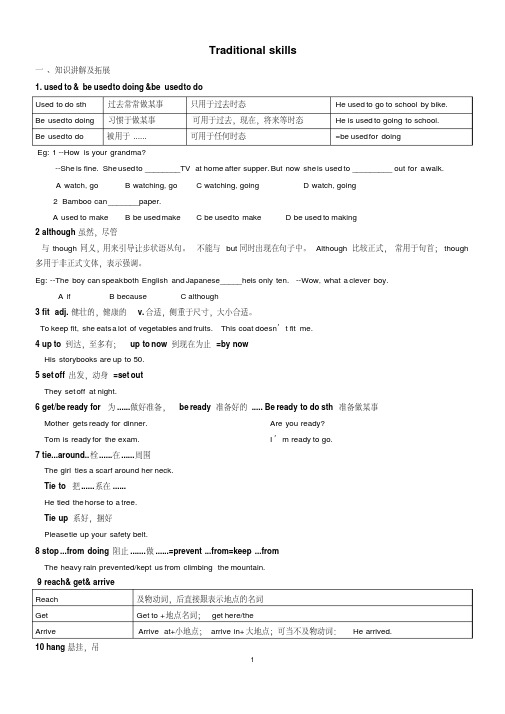广州新版八年级下册Unit3单元大归纳(被动语态)
八年级英语下册Unit3OnlinetravelGrammar知识点拨牛津版

八年级英语下册Unit3OnlinetravelGrammar知识点拨牛津版Unit 3 Online travel一、教学内容:Unit 3 Online travelGrammar二. 教学目标:掌握Unit3的词法结构和用法:Passive Voice1. 被动语态结构:be + 动词的过去分词。
2. 重点掌握以下6种情况的被动语态:①一般现在时的被动语态(am/is/are +过去分词)②一般过去时的被动语态(was/were +过去分词)③一般将来时的被动语态(will be +过去分词)/(am/is/are going to be +过去分词)④现在进行时的被动语态(am/is/are being +过去分词)⑤现在完成时的被动语态(have/has been +过去分词)⑥含有情态动词的被动语态(情态动词+be+过去分词)3. 重点掌握两种特殊情况的被动语态①含有使役动词、感官动词和help后接不带to 的动词不定式改为被动语态时要加上to。
②双宾语的情况改为被动语态时有两种改法。
4. 特别注意happen(take place)及系动词feel, sound, taste, smell, look等没有被动语态的情况。
经典讲解:被动语态英语中的语态(voice)英语中有两种语态:主动语态和被动语态。
1)主动语态(active voice)表示主语是动作的发出者、执行者. Many people speak English.主语many people 发出、执行了speak的动作2)被动语态(passive voice)表示主语是动作的承受者,即行为动作的接受者。
English is spoken by many people.主语English是动词speak的承受者。
被动语态的构成被动语态由“be+及物动词的过去分词”构成。
人称、数和时态的变化是通过be动词的变化表现出来的。
广州 新版 八下 Unit 3 Traditional skills知识点归纳

广州新版八下 Unit 3 Traditional skills知识点归纳Traditional skills一、知识讲解及拓展1. used to&be used to doing&be used to do--She is fine.She used to________TV at home after supper.But now she is used to_____ ____out for a walk.A watch,goB watching, goC watching, goingD watch,going2Bamboo can_______paper.A used to makeB be used makeC be used to makeD be used to making2although虽然,尽管与though同义,用来引导让步状语从句。
不能与but同时出现在句子。
Although比较正式,常用于句首;though多用于非正式文体,表示强调。
Eg:--The boy can speak both English and Japanese_____he is only ten.--Wow,what a clever boy.A ifB becauseC although3fit adj.健壮的,健康的v.合适,侧重于尺寸,大小合适。
To keep fit,she eats a lot of vegetables and fruits.This coat doesn’t fit me.4up to到达,至多有;up to now到现在为止=by nowHis storybooks are up to50.5set off出发,动身=set outThey set off at night.6get/be ready for为......做好准备,be ready准备好的.....Be ready to do sth准备做某事Mother gets ready for dinner. Tom is ready for the exam.Are you ready?I’m ready to go.7tie...around..栓......在......周围The girl ties a scarf around her neck.Tie to把......系在......He tied the horse to a tree.Tie up系好,捆好Please tie up your safety belt.8stop...from doing阻止.......做......=prevent...from=keep...from The heavy rain prevented/kept us from climbing the mountain.9reach& get& arrive悬挂: hang-hung-hung; 绞死,吊死: hang-hanged-hanged11 throw 短语Throw ...into 把......扔进.... Throw away 扔掉throw off 匆匆脱掉 throw at 向......扔去He threw a stone into the river. Throw away those old newspapers. Don’t throw off your coat. It’s cold outside. Tom threw stones at my dog.12 require& needThey require that I should appear. I need to buy a new bike.You needn’t come.13 no more& no longerHe is no more a student.= He isn’t a student any more.14 mistake 错误Make a mistake 犯错误by mistake 错误地,无意Mistake A for B 把A 错认成BHe makes a lot of mistakes in grammar.I took her umbrella by mistake.I often mistake Lucy for Lily.Tom left for Shanghai two weeks later.16 keep 短语Keep sb/sth + 形容词: 使......保持......; keep +形容词:保持某种状态; keep (sb) doing : 不停地做某事 Coats will keep you warm. We should keep out school clean and tidy. The shop keeps open twelve hours a day.Don’t keep talking.17 名词+y=形容词Health(健康)+y=healthy (健康的) luck(幸运)+y=lucky (幸运的)In good/bad/poor health 健康状况好/不好keep healthy 保持健康For luck 为了吉利;bad luck 倒霉 good luck 好运 18 be made from& be made ofBe made from 由......制成;看不出原材料Be made of 由......制成;看得出原材料Be made up of 由......组成Be made into 被制成..... Be made in 在......制造They made wine from rice.Paper is made from wood.The house is made of wood, The doll is made up of four parts.二、语法——被动语态英语动词有两种语态:________________和___________________。
八年级三单元英语知识点总结

八年级三单元英语知识点总结第一部分:动词时态动词时态是英语中非常基础的语法知识点,同时也是易错点之一。
在八年级第三单元中,学生需要掌握一般现在时、一般过去时、一般将来时等三大基本时态。
一般现在时用于描述经常性或普遍性的动作或状态,比如:I go to school every day.(我每天上学。
)一般过去时用于描述已经发生的过去的动作或状态,比如:I played football with my friends yesterday.(昨天我和朋友们一起踢足球。
)一般将来时用于描述未来将要发生的动作或状态,比如:I will visit my grandparents next week.(下周我要去拜访我的祖父母。
)需要注意的是,动词时态与主语的人称和数保持一致。
例如在一般现在时中,第三人称单数主语需要加s或者es,比如:She goes to school every day.(她每天上学。
)第二部分:被动语态被动语态是指主语是动作的承受者,而不是执行者的语态。
在八年级第三单元中,学生需要掌握如何构成被动语态以及如何使用被动语态。
被动语态的构成:be(动词be的各种形式)+过去分词。
例如:The book is written by him.(这本书是他写的。
)需要注意的是,在被动语态中,执行者通常可以用“by+人称代词或名词”表达出来,比如:The book is written by him.(这本书是他写的。
)此外,被动语态可以用于强调所承受的动作,例如:The house was destroyed by the earthquake.(这个房子被地震摧毁了。
)第三部分:情态动词情态动词是一类用于表示推测、建议、允许、禁止、义务等不同语气和情态的动词。
在八年级第三单元中,学生需要掌握can、could、may、might、should、must等常见的情态动词。
can表示能够,可以的意思,could表示过去或可能的情况。
八年级人教版英语下册unit3知识点

八年级人教版英语下册unit3知识点Unit 3 Language in use一、句型结构1. What did you do…?A: What did you do yesterday?B: I cleaned my room.2. What was …like?A: What was the weather like yesterday?B: It was warm and sunny.3. When did …?A: When did you finish your homework?B: I finished it at nine o’clock last night.4. How was …?A: How was your weekend?B: It was great! I went to the park and played basketball with my friends.二、动词时态1. 一般过去时:表示过去经历或已经完成的动作或状态。
I walked to school yesterday.She watched a movie last night.2. 过去进行时:表示过去某一时刻正在进行的动作。
We were playing basketball at six o’clock yesterday evening.They were studying English when the teacher came in.3. 过去完成时:表示过去的某个时间或动作之前已经完成的动作。
He had finished his homework before he went to bed.I had never been to Shanghai before last year.三、被动语态被动语态的构成:be动词(am、is、are、was、were)+过去分词。
1. 一般现在时被动语态:The apples are picked by the farmers.2. 一般过去时被动语态:The book was written by Li Bai.3. 现在进行时被动语态:The dishes are being washed by my sister.四、语态转换主动语态变被动语态,被动语态变主动语态。
英语八年级(下)Unit3重点短语和句子教学提纲

英语八年级(下)U n i t3重点短语和句子精品文档收集于网络,如有侵权请联系管理员删除英语八(下) Unit3重点短语和句子——短语1. 倒垃圾2. 洗餐具3. 叠衣服4. 扫地5. 整理床铺6. 打扫起居室7. 请求8. 做家务事9. 搭车10. 操作电脑11. 看完节目12. 两小时电视13. 这么多14. 购物回来15. 解决问题16. 扔下17. 走过来18. 遛狗19. 顶嘴20. 下班21. 整天、整晚工作22. 一…就…23. 惊讶地问24. 一直看电视25. 出去吃饭26. 递给某人某物27. 从…借…28. 把…借给29. 借5天书30. 沾到水、变湿31. 带帐篷32. 邀请朋友聚餐33. 去购物34. 厌恶做某事35. 对某人(没)有礼貌36. 时间的浪费37. 在某方面花时间38. 花时间做某事39. 为了40. 我们两个没有41. 学会如何做某事42. 进入一所好大学43. 依赖44. 独立45. 为某人提供46. 培养孩子自立能力47. 发达、发展中国家48. 理解公平的内涵49. 在某事上做自己分内的事50. 照顾51. 不知、没有想法52. 病倒53. 结果54. 做某事足够55. 对于某人来说做某事没有必要56. 不介意做某事57. 越早越好58. 对…公平的/不公平的精品文档英语八(下) Unit3重点短语和句子——句子1.请你倒一下垃圾好吗?当然可以。
2.我现在要用你的电脑来工作。
3.你能帮忙做点事吗?4.我能至少先看完这个节目吗?5.我认为看两小时电视对你来说已经足够了。
6. 如果她看见这一团糟会不高兴的。
7.我刚坐在电视机前,妈妈就走了过来。
8.我的妈妈什么也没说就走开了。
9.一周的时间,她没做家务,我也没做。
10.看完电影后我们能喝一些东西吗?11.我切了手指,我正努力避免沾到水。
12.现在的孩子已经有很大的学业压力。
13.他们应该把时间用在学业上,以便取得好成绩,进入一所好大学。
广州新版八下英语unit 3 traditional skills

Unit 3 Traditional skills一、要点概括1.短语Paper cutting, up to, set off, up dan down, after dark, no more, all the time2.句型(1)Would you like to take part in our...?(2)Although he is over 65, he is very fit and still enjoys working.(3)They can dive down and stay under the water for up two two minutes.(4)Daimin usually stes off in the late afternoon and gets the cormorants ready for work.(5)During the day, he jumps up and down on his boat.(6)At dark, he hangs a light on a post at the front of the boat.(7)The fish are taken and thrown into a big basket by Damin.(8)No nets are required for this type of fishing.(9)Cormorant fishing was once practised in lots of places in South-East China.(10)Later, some of the fish will be sold in the market.二、疑难宝典1.hang on 用作电话用语(其后可接a minute, a moment, a while之类的词),意为:等一下;别放下电话;别挂断。
(精校版)英语八年级下册第三单元知识点总结

(完整word版)英语八年级下册第三单元知识点总结(word版可编辑修改)编辑整理:尊敬的读者朋友们:这里是精品文档编辑中心,本文档内容是由我和我的同事精心编辑整理后发布的,发布之前我们对文中内容进行仔细校对,但是难免会有疏漏的地方,但是任然希望((完整word版)英语八年级下册第三单元知识点总结(word版可编辑修改))的内容能够给您的工作和学习带来便利。
同时也真诚的希望收到您的建议和反馈,这将是我们进步的源泉,前进的动力。
本文可编辑可修改,如果觉得对您有帮助请收藏以便随时查阅,最后祝您生活愉快业绩进步,以下为(完整word版)英语八年级下册第三单元知识点总结(word版可编辑修改)的全部内容。
Unit 3。
Could you please clean your room?一、短语动词1、take out 带出去;取出;拔出;除掉动副词组代词作宾语时必须放在两词之间.2、come over 固定短语过来,顺便来访,拜访.后面加介词to,后接表示地点的名词作宾语。
拓展:take out of 把—-—从—--取出/带出3、hang →hung→hung hang out 闲逛;溜达。
4、throw down扔下;随手丢下其中throw可用作及物或不及物动词,意为扔,掷→threw→thrown拓展:throw at向———-扔去(带有攻击性)throw to 扔给—--(不含恶意) throw away扔掉SectionB1、take care of 照顾;照料。
相当于 look after后可接名词、(反身)代词作宾语。
Take good care of相当于look after well2、二、动词用法1、finish 及物动词完成后跟名词、代词或动词ing形式作宾语.拓展:与finish一样用法的动词或动词短语有:enjoy/look forward to/mind/have fun/practice/be busy/consider/feel like/give up2、pass用作及物动词给;递; pass sb sth =pass sth to sb把某物递给某人。
广州-新版-八下-Unit-3-Traditional-skills知识点

Traditional skills一、知识讲解及拓展1. used to&be usedto doing&be usedto doUsed to do sth 过去常常做某事只用于过去时态He used to go to school by bike.Be usedto doing 习惯于做某事可用于过去,现在,将来等时态He is used to going to school.Be usedto do被用于......可用于任何时态=be usedfor doingEg:1--How is your grandma?--She is fine.She usedto________TV at home after supper.But now she is used to_________out for awalk.A watch,goB watching, goC watching, goingD watch, going2Bamboo can_______paper.A used to makeB be usedmakeC be usedto makeD be used to making2although虽然,尽管与though同义,用来引导让步状语从句。
不能与but同时出现在句子中。
Although比较正式,常用于句首;though 多用于非正式文体,表示强调。
Eg:--The boy can speakboth English and Japanese_____heis only ten.--Wow,what a clever boy.A ifB becauseC although3fit adj.健壮的,健康的v.合适,侧重于尺寸,大小合适。
To keep fit,she eatsa lot of vegetables and fruits.This coat doesn’t fit me.4up to到达,至多有;up to now到现在为止=by nowHis storybooks are up to50.5set off出发,动身=set outThey set off at night.6get/be ready for为......做好准备,be ready准备好的.....Be ready to do sth准备做某事Mother gets ready for dinner. Tom is ready for the exam.Are you ready? I’m ready to go.7tie...around..栓......在......周围The girl ties a scarf around her neck.Tie to把......系在......He tied the horse to a tree.Tie up系好,捆好Pleasetie up your safety belt.8stop...from doing阻止.......做......=prevent...from=keep...fromThe heavy rain prevented/kept us from climbing the mountain.9reach& get& arriveReach及物动词,后直接跟表示地点的名词Get Get to+地点名词;get here/theArrive Arrive at+小地点;arrive in+大地点;可当不及物动词:He arrived.10 hang 悬挂,吊悬挂: hang-hung-hung; 绞死,吊死: hang-hanged-hanged11 throw短语Throw ...into 把......扔进.... Throw away 扔掉 throw off 匆匆脱掉 throw at 向......扔去He threw a stone into the river. Throw away those old newspapers. Don’tthrow off your coat. It’scold outside. Tom threw stones at my dog.12 require& needRequire 及物动词 Require to be done; require doing; require sb. to do Need 及物动词Need to do; need to be done; need doing情态动词Need doPlants require watering every day. They require that I should appear.I need to buy a new bike. The room needs to be cleaned. You needn’tcome.13 no more& no longerNo more不再常用来修饰非延续性动词,表示今后不再重复以前发生的动作,多指数量上不再增加,程度不再加深。
- 1、下载文档前请自行甄别文档内容的完整性,平台不提供额外的编辑、内容补充、找答案等附加服务。
- 2、"仅部分预览"的文档,不可在线预览部分如存在完整性等问题,可反馈申请退款(可完整预览的文档不适用该条件!)。
- 3、如文档侵犯您的权益,请联系客服反馈,我们会尽快为您处理(人工客服工作时间:9:00-18:30)。
八年级下册Unit3 单元大归纳一、温固而知新:1、remind的用法:(2个)2、表示提供建议的句型:(5个)3、accept, receive的区别:4、think of, think about, think over的区别:5.动名词的用法:(1)(2)(3)二、新授:Unit 3 重点短语剪纸:达到:出发:黄昏后:起伏,上下波动:一直:不再:(4个)下潜:傍晚:让…准备好:上演,展出:裁剪:在...前部:对...感兴趣:皮影戏:“到达”:用…做成(2个):阻止…做某事:(3个)hang --- --- ( )hang --- --- ( )重要知识点:(1)though 和although相同点:①两者都表示“虽然,即使”的意思②两者都不能和“but”连用,但可以和 yet/ still连用例句:Although Jim is not a Japanese,(yet) he speaks good Japanese.不同点:① although语气较重,用于正式场合。
(通常放句首)② though可用作副词,(放全句)例句:It's hard work, I enjoy it though. 这是苦差事,可我干得颇有乐趣。
There's no excuse, though , for hurting her feelings. 伤到她的感情一事,还是不可原谅。
③as though = as if 好像,仿佛even though = even if 尽管例句:Even though I have worked so hard,I still did not pass the exam.尽管我如此努力,我还是没有考及格。
Everything went on as usual as though nothing had happened.一切照常进行,好象什么事也没有发生练习:()1. he is very young, he knows several languages.A. Though, butB. Because, soC. Though, /D. Because, /( )2. the factory is small, its products are of very good quality.A. Although, andB. Although, butC. Though, butD. Though, yet( )3. I met many difficulties, it was a very valuable experience for me.A. Although, butB. /, althoughC. Because, butD. If, however( )4. Sam isn’t very rich. He always helps the poor, .A. thoughB. althoughC. howeverD. but2、require的用法:(1)require +名词(2)be required to do :(3)require sb to do sth:例句:If you need more information, please let me know.True friendship requires us to show that.实战演练:1. 你要在本周六完成。
You finish it this Saturday.2. I clean the room. 我被要求打扫这间房间I clean the room. 我要求他来打扫这间房间.3. 老板要求我要在今天完成这任务。
The boss finish the business today.4. 这些宠物需要悉心照料。
These pets a lot of care and attention.?【回顾】:1、“到达”的几种表达方式:2、练习做某事:用…做成(2个):阻止…做某事:(3个)Unit 3 单元语法被动语态(一)观察:I clean the room. (主动语态)The room is cleaned by me (被动语态)从句子意义上说,就是找出“什么事物”是“被完成”的。
被动语态(一)1、构成:2、★主要体现:sth. 作为句子的主语。
常见的几种时态的被动语态如下(以动词do为例):时态构成例句一般现在时am / is / are + done An apple is eaten by me every day.一个苹果每天都被我吃掉。
一般过去时was / were + done He was taken to the park by his mother yesterday.昨天,他被妈妈带去了公园。
一般将来时will be + done The child will be sent to his parents next week.那个小孩子下个月将要被送回他的父母那里。
如何将主动变被动?实战演练:(1)一般现在时的被动语态:1.Football (play) all over the world.2. Many trees (plant) in North China.3. Rice (grow) in South China4. A camera (use) for taking photos5. I often (ask) to do this work.(2) 一般过去时的被动语态:1. The house (build) in 1978.2. All the students (ask) to bring a kite with them last Sunday.3. The car (clean) by Dad yesterday.4. I (tell) to wait for him yesterday.三、习题演练:练习:1)单词拼写1.It is not very difficult to understand the d__________ of that kind of medicine.2.He cut off the flowers from the plant with a pair of s__________.3.For thousands of years, f__________ use this tool to catch fish.4.In this shop you can find different s__________ of shoes.5.If you want to keep f__________ , you must do exercise every day.6.From your d__________ , I know that the Rubber Duck is very lovely.7.Tara likes that piece of scarf very much because the p__________ on it is very beautiful.8.Which t__________ do you need when you fix your car?9.This Chinese submarine(潜艇)can d__________ down more than 1000 meters.10.These lamp p__________ are so beautiful.2) 完成句子。
1.那天天气非常差,小船在海上上下起伏。
That day the weather was very bad. The small boat was __________ __________ on the sea.2.吉姆的姐姐非常聪明。
她很善于剪纸。
Jim's sister is very smart. She is good at __________ __________.3.天黑以后,汤姆和他弟弟就回家吃晚饭去了。
__________ __________, Tom and his brother went home to have supper.4.因为这里的风景太美丽了,那位老渔民始终生活在这里。
That old fisherman lives here __________ __________ __________ because the scenery is so beautiful.5,自从他被爸爸打过以后,他再也没有逃课。
He has __________ __________ cut classes since he was beaten by his father.6.昨天傍晚,广场上有很多人在跳绳。
__________ __________ __________ __________ yesterday,many p eople were jumping rope in the square.7.蒂娜虽然长得又矮又胖,却很可爱。
Though Tina is __________ __________ __________ , she is very lovely.8.在政府的帮助下,皮影戏又流行起来了。
With the help of government __________ __________ __________ are popular again.9.明天早上我们就会出发去巴黎。
Tomorrow morning we will __________ __________ to Paris.10.他太穷了,他至多有100块钱。
He is too poor and he has __________ __________ 100 yuan.3) 语法选择A篇Dragons are not real animals, but look like a combination(结合体)of many animals such as snakes, fish and deer. With great powers, they fly in the sky or swim in the sea. The rain is also made __1__ them . The Chinese dragon is a symbol of strength and good __2__.The kings of ancient China loved dragons. Their clothes __3__ with pictures of dragons.We are proud to call ourselves the "descendants(传人) of the dragon". In Chinese, "excellent" people __4__ "dragons". There are some famous "dragons", for example, the great man Deng Xiaoping, and the famous businessman Li Jiacheng, __5__ number of Chinese sayings and idioms talk about dragons, for example, "long to see one's child become a dragon." It means __6__ he or she will be successful.There are also some traditional festivals about dragons, such as Dragon Boat Festival. We have different kinds of activities to celebrate it. __7__ the festival comes every year, the Year of the Dragon comes every twelve years.The dragon is very important in Chinese culture. __8__ the "descendants of the dragon", __9__ is neccessary f or us to know the views on dragons in our culture. It can help us __10__ why our parents always want us to be "dragons".1.A.by B.of C.from D.in2.A.lucky B.luckily C.luck D.unluck3.A.cover B.were covered C.are covered D.covered4.A.call B.called C.are called D.were called5.A.A B.The C.An D.\6.A.to hope B.hoping C.hoped D.is hoped7.A.Because B.Although C.If D.But8.A.For B.To C.As D.By9.A.it B.this C.that D.its10.A.understanding B.understands C.understood D.understandB篇MoYan is the winer of the 2012 Nobel Prize for Literature (文学). He __1__ for Gaomi, Shandong Province. His parents were farmers. As a young boy, Mo __2__ care of the goats of the family. He enjoyed watching over them __3__ they were eating the grass. It was boring , but Mo liked it.He__4__ enjoyed the green open land of Shandong. He enjoyed looking into the clean blue sky and watching white clouds. Sometimes, he told the goats his feelings and stories. It was the beginning of his life as a storyteller/Many years __5__ , Mo left school and worked for a company. This was difficult for Mo __6__ he loved reading. Luckily , a friend lent him __7__ books. Later, Mo joined the army and could __8__ learning. Then he began to write.__9__ Mo left Gaomi many years ago, Gaomi never left him. Many of his books __10__ about the country life and people in Gaomi. Mo is famous now, but he is still a true son of the soil(土地).1.A.came e es D.has come2.A.is taking B.takes C.took D.is taken3.A.while B.if C.since D.because4.A.also B.either C.too D.neithertely test ter te6.A.because B.so C.but D.before7.A.more B.much C.some D.any8.A.go on B.went on C.is going on D.gone on9.A.But B.However C.Although D.When10.A.are B.is C.was D.were答案:单词拼写答案:Description, scissors, fishermen, sizes, fit, Description, pattern,tool, dive, posts完成句子答案:Up and down, paper cutting, After dark, all the time, no more, In the late afterniin, short and heavy, shadow suppet plays, set off, up toA篇:ACBCA BBCADB篇:CCAAC ACACA。
